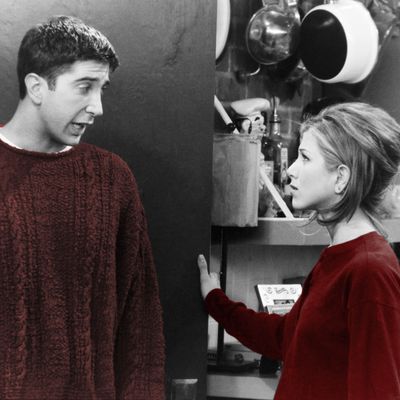
In honor of Valentine’s Day, Science of Us is spending this week talking about love — specifically, what happens when it goes wrong. If you ever wondered about the psychology of breakups, we’ve got you covered.
If you’re even a casual fan of the show Friends, you may be familiar with the scene where a drunken Rachel calls up Ross to declare that her crush on him — a crush that he was unaware of — is finally finished. “I am over you,” she slurs into the phone, “and that, my friend, is what they call closure.” But saying it isn’t enough to make it so, and (spoiler alert) closure doesn’t come.
While a television sitcom may not be the best place to turn for relationship advice, the scene does tell us something real about both breakups and unrequited love: When things are over — or when it becomes clear that the affection isn’t reciprocated — people want the pain to go away, or they want to get over their feelings, or they want some other type of demarcation between now and whatever comes next. In short, they want that nebulous thing we often refer to as “closure.” The dictionary defines closure as the “act or process of closing something,” or “a feeling that an emotional or traumatic experience has been resolved”; when it’s applied to relationships, the word refers to the ability to move on without being haunted by any lingering pain, regrets, or doubts.
But knowing what it means and knowing how to achieve it can be two entirely different things — and closure, like love itself, is often deeply misunderstood.
“Even when the breakup is mutual,” says journalist Wendy Paris, author of Splitopia: Dispatches From Today’s Good Divorce and How to Part Well, that doesn’t necessarily mean closure will come easily: “You have been invested in this partnership, in this story line and vision of your life.” Paris, who got divorced from her husband five years ago, argues that closure has two parts: “First, accepting that your story has changed and what you had hoped for is no longer your reality, and second, creating a new vision for where you want your life to go.”
Psychologists would agree. In the last decade, relationship researchers have closely studied breakups to understand how people can move forward afterward. What they’ve found is intriguing: A major reason why breakups are so hard is because they cause a crisis of identity — and we need to resolve that crisis to move forward.
Part of the problem is that being rejected makes us feel unlovable and unworthy. We wonder: Is there something inherently wrong with me? Will I find love again? That old love gave my life meaning, and I no longer have it, so where do I find meaning now?
And as Melissa Dahl has explained for Science of Us, the end of a relationship can distort our sense of self. Research shows that when people are in a healthy relationship, their sense of self expands to include their partner. “There is less ‘me’ and more ‘we,’” explained Gary Lewandowski, a leading relationship researcher at Monmouth University. But when the relationship ends, that expanded identity shatters, and individuals begin a process that psychologists call “self-contraction.”
In one study, Lewandowski and his colleagues found that people who felt their relationship really expanded their sense of self — that it made them a “better person” and helped them grow their “capabilities” — were more likely to say that the breakup caused them to lose a part of who they are. A separate set of studies led by Erica B. Slotter of Northwestern University came to a similar conclusion: After a breakup, she and her colleagues found, people understood themselves less clearly and even said that they felt smaller psychologically — and this reduced “self-concept clarity” was associated with greater post-breakup emotional distress.
Achieving closure, then, might best be understood as regaining a sense of who you are outside of your ex. Paris describes the process as a “sifting”: “What am I taking from this that’s still part of my identity, and what am I letting go?”
This “sifting” can be complicated and confusing, but one way to move it along is to pursue activities that align with who you want to be. In his research, Lewandowski has found that people get over a breakup more quickly when they make a conscious effort to rediscover their pre-relationship selves. That could mean picking up a hobby that they abandoned before the relationship, like running marathons, or doing something new that aligns with their values, like writing poetry or volunteering. When people return to or explore what they intrinsically value, they start defining their sense of self in terms of their own interests rather than in terms of what their ex thinks of them, which helps them overcome the pain of the split.
How quickly you find a sense of peace after a breakup also depends on the story you tell yourself about why the relationship ended. Researchers Lauren Howe and Carol Dweck of Stanford University, who have collected and analyzed hundreds of breakup stories, argue that when people tell harmful stories about themselves and the breakup, it hinders their ability to find closure. “Things were going well,” one research subject wrote, “when all of a sudden he stopped talking to me. I have no idea why, but I think he saw that I was too clingy and this scared him away.” Another explained: “I just feel hurt and rejected. I try to tell myself that it wasn’t my fault and that it was that person’s loss but I can’t help but feel inadequate.” In both cases, the storytellers have allowed the rejection of the breakup to define them and indict their character.
These stories are “maladaptive,” Howe says, helping the pain of rejection to linger for longer. Why? “That kind of story,” Howe explains, “is a blow to your self-concept. You’re left wondering, Is there something negative about me that’s going to harm my future relationships?”
Instead, she says, it’s better to tell a story that doesn’t focus so much on the self. In her studies with Dweck, Howe found that the people who moved on more quickly after a breakup were also typically those who didn’t blame themselves for the relationship’s end. Instead, they told a story that blamed their circumstances: The relationship ended because the timing wasn’t right, or thanks to incompatible personalities. “Sometimes girls are not interested. It’s nothing to do with yourself, it’s just that they’re not interested,” said one subject. “Everyone gets rejected,” said another. “It’s just part of life.” Others told stories of growth — they said they matured as a result of the breakup, for example, by learning how to forgive or becoming better at communication in relationships. The people who understood their breakups through these types of stories — ones that put distance between the rejection and themselves — ultimately experienced less emotional distress as a result.
At the end of that episode of Friends, Ross and Rachel discover they have feelings for each other, and one of TV’s most well-known on-again-off-again couples continues to hop between on and off for several more seasons. But that’s television. In the real world, most people will have to come to terms, at some point, with the painful fact that their relationships are truly over, without the comfort of knowing things may one day go back to the way they were.
And to do that, they have to think of themselves as the protagonists in a story that moves them forward. “A breakup can be unexpected,” says Paris. “It’s a narrative glitch. It’s not the story we were living. But you have the power to retell that story in a way that’s empowering.”
Emily Esfahani Smith is the author of The Power of Meaning: Crafting a Life That Matters.





